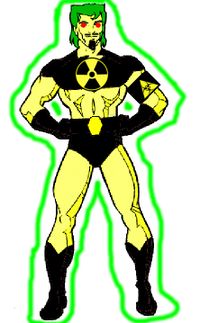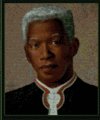Captain Planet and the Planeteers
| “ | By your powers combined, I am Captain Planet! | ” |
“Isn't America basically the planet?”
Captain Planet and the Planeteers is an American animated environmentalist television program from the American animation revival of the early 1990s. It centers on several illegal immigrants who join powers with a scraggly looking Brooklynite to summon Captain Planet. The series was created by Ted Turner and aired on his syndicated cable channel TBS. Like many who reach a state of power in the media, Turner saw no reason not to use a little of his clout in promoting his point of view. And his point of view happened to include some very non-mogul-like attitudes toward the environmental movement.
With a stellar voice cast — Levar Burton, Ed Asner, Margot Kidder, Whoopi Goldberg, Meg Ryan, Sting, Jeff Goldblum, James Coburn, David Warner, Malcolm McDowell, Martin Sheen, and Tim Curry all did voice work for the show resulting in an environmental disaster with the scenery for dozens of miles around being chewed up — it presented formulaic adventures of Sunday school environmentalism to children every Saturday morning.
Ecoterrorism is bad, kids. Give a hoot, vote Ralph Nader.
Plot[edit | edit source]
Gaia, personification of the spirit of the Earth, musters a carefully multicultural team of Planeteers, teenagers granted magic rings that give them superpowers based on the alchemical elements. They are:
- Kwame (Levar Burton), an African from Ghana, given the power of Earth;
- Wheeler (Joey Dedio), an American from Brooklyn, and the least responsible Planeteer, given power of Fire;
- Linka (Kath Soucie), a Soviet (later Russian) given power of Air;
- Gi (Janice Kawaye), from Thailand, given power of Water;
- Ma-Ti (Scott Menville), a Native American from the Amazon basin of Brazil, given the power of Heart.[1]
Each of the Planeteers has a variety of powers from their respective element based magic rings (freezing ray, fire manipulation, animal telepathy, etc.) which they can combine to summon Captain Planet (David Coburn); a blue skinned, green mulleted environmental Übermensch. Captain Planet, more powerful than all of the Planeteers acting separately, possesses flight, super strength and basically any other superpower the writers need to fit the episode's plot. Despite his great strength, Captain Planet is not invincible; pollution and toxic waste are his Kryptonite, and he can be weakened by dousing him in the stuff.[2] When Captain Planet has prevailed, he returns the powers to the five Planeteers with the slogan "The power is yours!"
While Captain Planet is typically only called when things become most dire for the Planeteers, nearly every episode features his eventual calling to dispose of the polluting malcontent, rescue the Planeteers and save the day, leading one to wonder: why don't the Planeteers just summon the Captain at the first sign of trouble?
The Equipment[edit | edit source]
Inefficient Oil Powered Jet[edit | edit source]
Despite the fact that it only worked during the day, the solar powered jet was the Planeteers main method of globetrotting. The pollution free vehicle was invented by a young Al Gore in 1977, and is said to be part of his pre-work on the internet. It remained locked up in his parents garage until the early eighties when it was swallowed by the earth (along with Mr. and Mrs. Gore). Whexzzvxzn Giah (AKA Mother Earth)was cleaning out her basement she found it and decided to give it to the planeteers along with some other crap, she wanted to get rid of.
The planeteers were renowned to be very protective of their jet. To the extent that when they were approached by leading aerospace companies about being able to research the design for mass production they declared all aerospace research to be ecoterrorism.
Because they only traveled during the day (and thus had to do all planet saving by night) some have speculated that the planeteers are, in fact, vampires.
Themes[edit | edit source]
Apart from pseudoscientific themes like Gaia and alchemy?
Enlisting children in environmental causes has long been a project of the environmental movement.[3] On the other hand, actual environmental issues take place in a real world without superheroes. Captain Planet and the Planeteers could not fight real world polluters without potentially leading children to ask uncomfortable questions about Mom and Dad's jobs. That might lead to undesired blowback.
Instead, Captain Planet fought a recurring standard superhero's rogues' gallery of villains, given obviously evil names like "Hoggish Greedily", "Verminous Skumm", and "Dr. Blight". All of these "Eco-Villains" enjoyed the environmental destruction they caused for its own sake, along with allegorically representing eco-vices like greed, poor sanitation, and mad science. True to the superhero genre, Captain Planet's triumphs over all of these Eco-Villains were both guaranteed and complete but disconcertingly temporary.
Other cartoons, from the 1955 short Goofy Gophers and the Lumberjerks[3] to Hayao Miyazake's Princess Mononoke (1997)[4] have dealt with environmental issues in a more nuanced manner that eschews polluters marring nature from sheer meanness. But nuance is overrated. At its best, Captain Planet becomes hilarious by its relentless bludgeoning message.
Ted Turner, like many others in the 1970s and 1980s, had an abiding dislike of nuclear energy, despite the fact that it is in many ways more environmentally friendly than other power sources. He puts forward this point of view in episodes like Meltdown Syndrome. Another issue dealt with is overpopulation and the importance of birth control, ironic considering that Turner himself has 5 children.
Some episodes veered away from environmental themes, to the sorts of sermons that were a mainstay of 1990s children's programming. The second season episode Mind Pollution is standard anti-drug propaganda remote from environmental concerns. Street gangs and their alleged evils, none of which loom large as environmental problems, were the subject matter of no less than four episodes.[5] The episode A Formula for Hate is not focused on environmental themes, but at least seeks to calm fears about the contagiousness of AIDS.
Special Feature: Where Are They Now?[edit | edit source]
Wheeler[edit | edit source]
Following a major conflagaration in Brooklyn, police discovered a disoriented Wheeler wandering the streets. Taken into custody, forensics experts discovered gasoline and other chemical accelerants soaked into his clothes. Police psychologists theorize that when he lost the Power of Fire, Wheeler's pyromaniac tendencies had no socially acceptable outlet. He was subsequently sentenced to a prison for the criminally insane until such time as he is deemed cured.
Linka[edit | edit source]
Returning to Russia, Linka became a journalist. Her most recent scoop was a major expose on corruption in the Putin government. Her current whereabouts are unknown. A known Communist.
Kwame[edit | edit source]
Able to control the rocks that form the Earth itself, Kwame went to work for the DeBeers diamond cartel. He recently purchased New Zealand.
He has, as he puts it, 'moved on' from his earlier environmental beliefs, now stating that 'business, money, stock markets, the environment and the slave trade should be able to co-exist'. He recently took on the role as mediator in a dispute between Captain Planet and the eco-supervillains as to whether the Grand Canyon should be turned into a toxic waste dump, saying that 'both sides make a good case'.
He has also launched a range of self-help books aimed at the management sector, including The Power is Mine! How to Planeteer yourself to the Top and You too can Achieve, Even if you Don't Have a Magical Ring.
Due to excessive wanking on Kwame's part during his entire life, not only was he blinded, but so were his children and grandchildren as a result. One of his descendants ends up working on the starship Enterprise as a blind engineer.
Gi[edit | edit source]
Has been in the press lately, after allegedly punching out Aquaman in a drunken brawl outside an LA nightclub. Gossip collumnists claim that this is part of a "pattern of abuse" against crapulent superheroes, and that there is some evidence that she has also attacked Rom, Space Knight, Roger Ramjet, Hoppy, the Marvel Bunny and the Ben Afleck version of Daredevil. When questioned by reporters as to why his former sidekick might harbour an obsessive hatred of minor superheroes, the Captain was unavailable for comment. His agent cited "solar whores" as the reason.
Mai-ti[edit | edit source]
Was originally depressed at having the worst power of the group, until he discovered it's true potential. He could communicate with any living creature. Utilizing this power he took over 80% of South America's drug cartels... BY making them LOVE him.
He now spends his days knee deep in coke and whores, that do his every bidding with just a wave of his ring..
His monkey is dead... Nobody cared about that little shit anyways.
Daily life of a Planeteer[edit | edit source]
The duties of a planeteer includes:
- Attending boring meetings on pollution in hopes of convincing politicians of strengthening pollution laws. Organized by Al Gore.
- Mowing the lawn on Hope Island. Cleaning Gaia's house. Washing Gaia's clothing. Changing the channel on Gaia's TV when she asks. Hey, you weren't expecting the spirit of the earth to do any of this lame stuff were you?
- Breaking the fingers of greedy American CEOs who pollute the environment and telling them they better clean up their act before the next "visit". Lynching them if they don't change.
- Recently Planeteers have been seen with Al Gore wearing red capes chasing a creature called Man-Bear-Pig. To date, no further information is available to the public except in Al Gore's own statements that he's "Super Serial"
Footnotes[edit | edit source]
- ↑ Some people think that Ma-Ti got the short end of the stick in this deal.
- ↑ In the episode A Good Bomb Is Hard to Find a time travelling Dr. Blight summons Adolf Hitler, who is such a polluting figure that he is able to weaken Captain Planet simply by glowering at him.
- ↑ 3.0 3.1 Pike, Deidre. (2012) Enviro-Toons: Green Themes in Animated Cinema and Television. (McFarland; ISBN 0786490020), p. 13
- ↑ Smith, Michelle J.; Parsons, Elizabeth (February 2012). "Animating child activism: Environmentalism and class politics in Ghibli's Princess Mononoke (1997) and Fox's Fern Gully (1992)". Continuum: Journal of Media & Cultural Studies (Routledge) 26 (1): 25–37.
- ↑ Utopia, Talkin' Trash, 'Teers In The Hood, and One of The Gang.
See also[edit | edit source]
|
More
| |
This page was originally sporked from RationalWiki |




